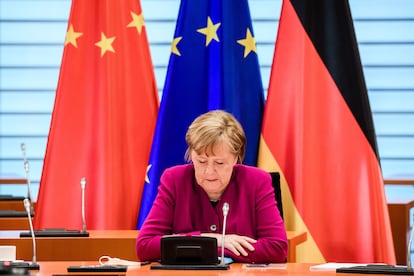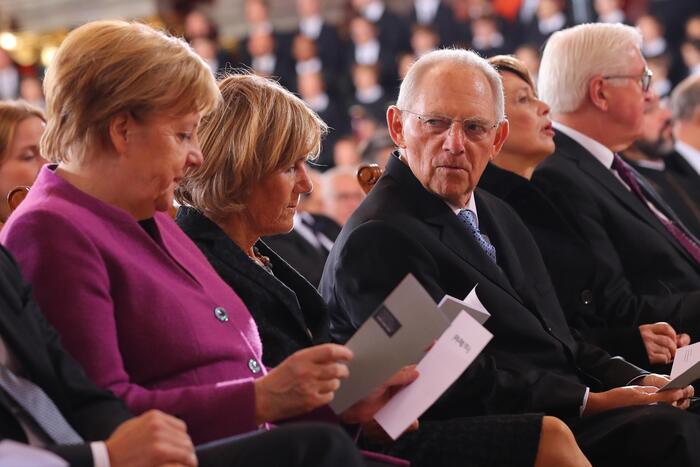Angela Merkel.CLEMENS BILAN / POOL / EFE
Angela Merkel is a political actress of the highest caliber.
However, she has never been a strategist, except when it comes to her own position.
Therefore, the most absurd thing that has been said of her has been the praise that she is the leader of the Western world.
Last week he did not even become the leader of the European Union when he failed in his attempt to get other presidents of the government to agree to resume high-level diplomatic relations with Vladimir Putin.
Merkel and Emmanuel Macron were upset that Biden spoke to Putin first.
As children on the playground, they did not want to be left out, and did not think for a minute what repercussions this would have for the Baltic States in particular.
Toomas Hen drik Ilves, former president of Estonia, accused Merkel of treating her compatriots as the subhuman beings of the intermediate countries of the Nazi Eastern General Plan.
Gustav Gressel of the European Council on Foreign Relations wrote that Merkel had destroyed her legacy in 24 hours.
I think it's even worse.
What happened was that a non-strategic policy was exposed.
It had never been otherwise, except that this time more people saw it.
Many of the things that are going wrong now in German foreign policy are the result of decisions made by Merkel long ago. In 2011, the chancellor reacted to the Fukushima nuclear accident by shutting down German nuclear power plants. This fateful decision was a disaster on many levels. Germany became overly dependent on Russian oil and gas, as well as the Nord Stream 2 gas pipeline. This, in turn, sparked a feeling of betrayal in the Baltic states, Poland and Ukraine. And by the way, Merkel managed to ruin transatlantic relations, which so far have not begun to be repaired.
When the global financial crisis broke out in 2008, the president insisted that each member state had to take over its own banks.
In 2012, it categorically ruled out Eurobonds.
That year, the euro zone was in danger of collapsing, prevented by the intervention of Mario Draghi.
When the pandemic hit, Merkel was drawn into accepting a recovery fund, an act that, outside of Germany, was widely misunderstood as the first in a series of steps toward a fiscal union.
I am not an admirer of Gerhard Schröder, Merkel's predecessor, and not even of her reform program, which I criticized at the time as being detrimental to the cohesion of the euro zone.
But it must be recognized that the former chancellor did what he believed was correct.
He did it knowing full well that the reforms would sink him, as they did.
Merkel has never done something like this. His decision to open the borders to refugees was not a strategic decision, but a spontaneous executive act. It did not consult with its coalition partners or with the other EU Member States. In his 16 years as chancellor, he has never chosen a strategic battle, he has never tried to seek majorities where there were none before. Merkel's only purpose has been herself.
The chancellor's lasting legacy to the European Union will be the recognition that strategic autonomy has been tried and failed. Neither Merkel nor Macron have provided strategic leadership. If we look at the landscape of possible successors, I do not see changes on the horizon. The future success of the EU will fundamentally depend on its detachment from the illusion of Franco-German leadership. Any debate on strategic autonomy should start with strategy, and not with who sits in the chair or on the couch, as is currently the case.
The events of last week ended another European mirage: the idea of majority voting for foreign policy. If the majority vote had been in force, a majority of 20 countries would have managed to defeat the seven, mostly small ones, that opposed it. The Baltic republics will insist on the veto because they know very well what happens when they don't.
The Merkel years have also been the swan song of an outdated late industrial age.
When this is over, people will ask the unpleasant questions that they did not ask during those years: why was a rich country like Germany not able to invest in new technologies?
Why did Merkel refuse to lay a solid foundation for the euro zone?
Why did you do business with Putin and make your country dependent on Russian natural resources?
Why did you accept the climate goals and then not implement them?
I have long come to the conclusion that Merkel is the most overrated political leader of our time.
Last week, a few more people started seeing it too.
Wolfgang Münchau
is Director of www.eurointelligence.com
Translation of
News Clips.









